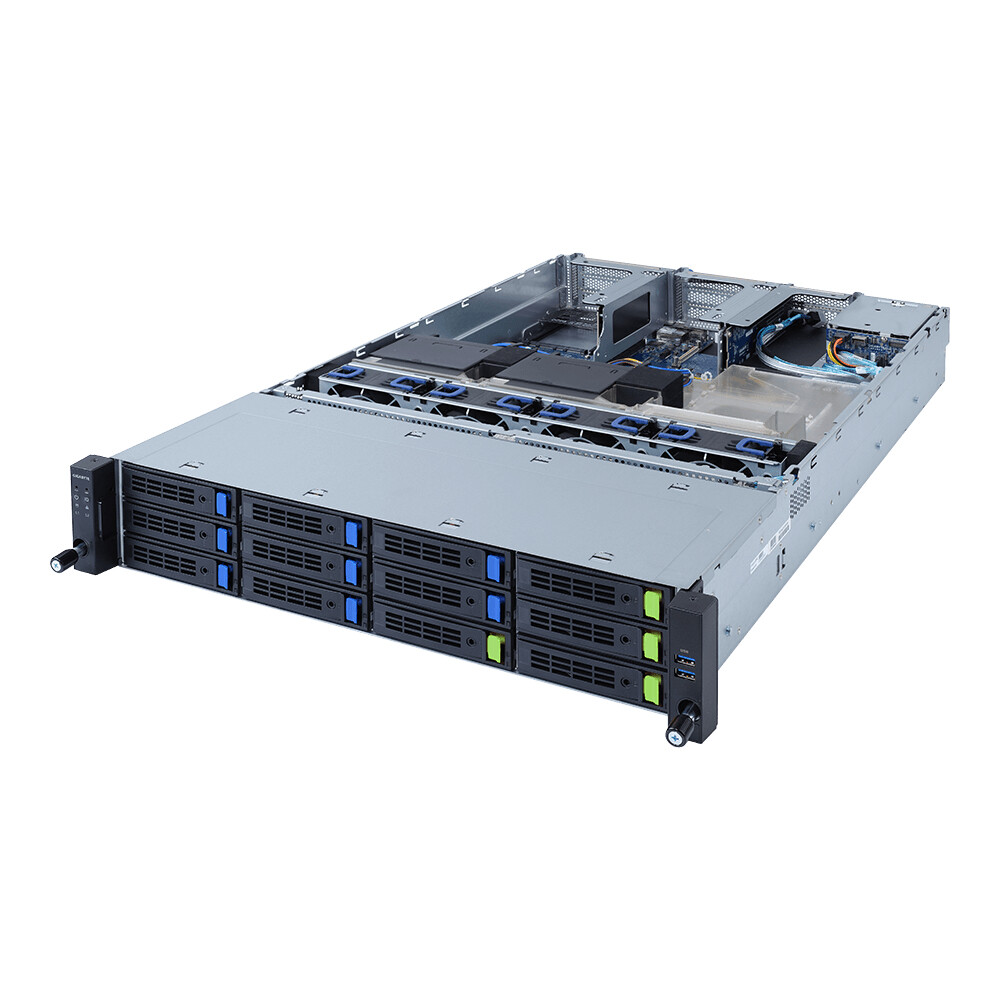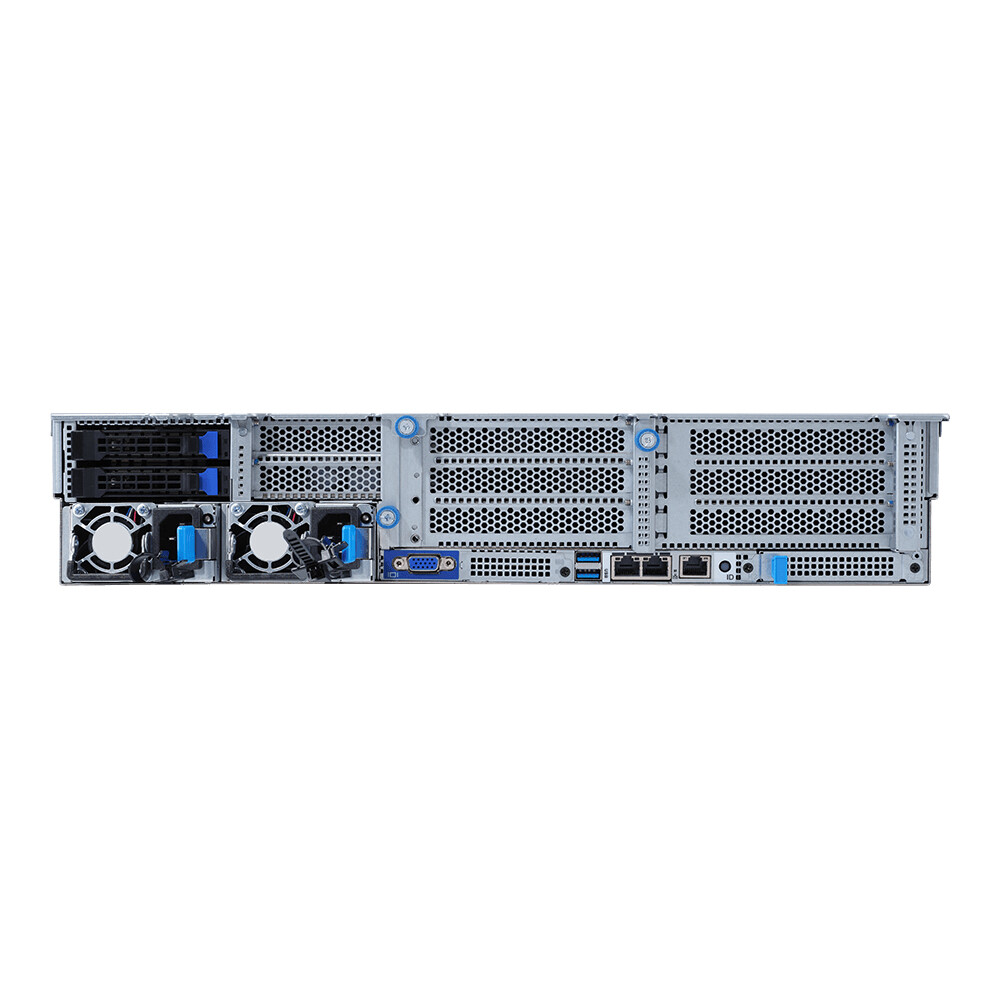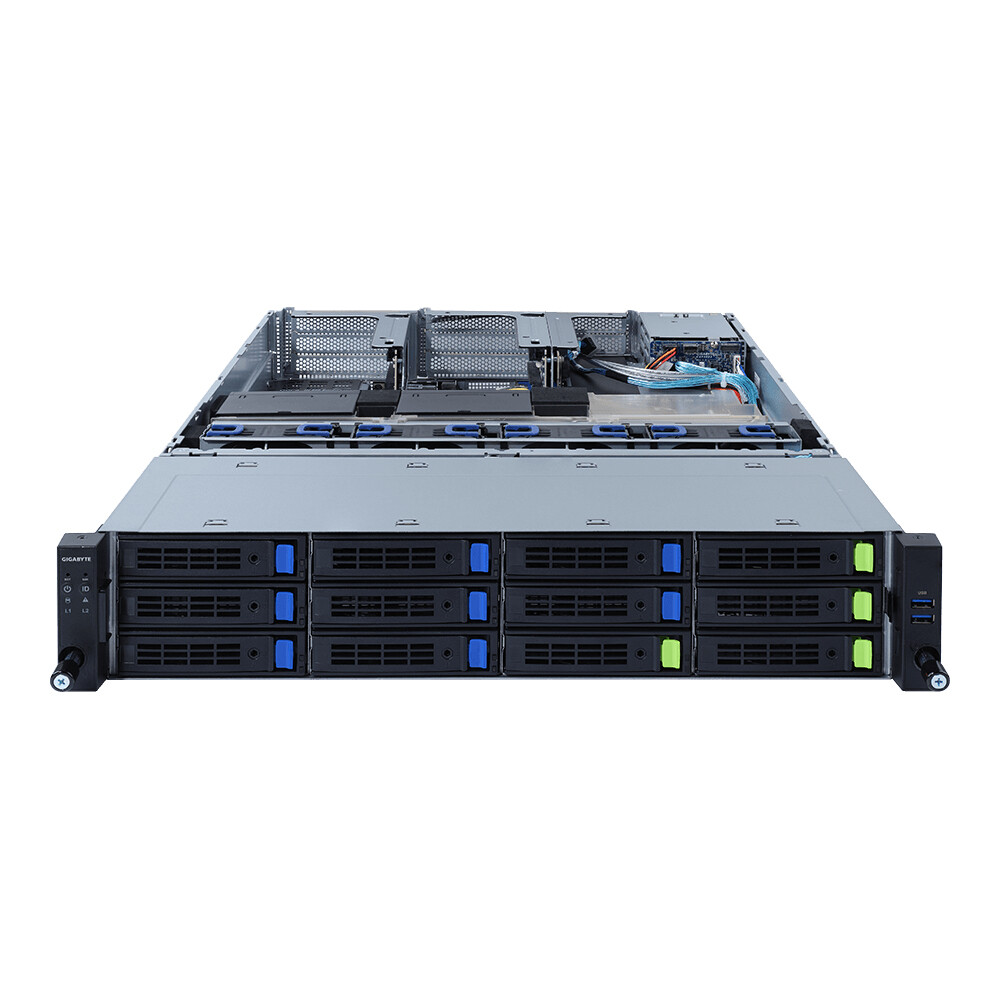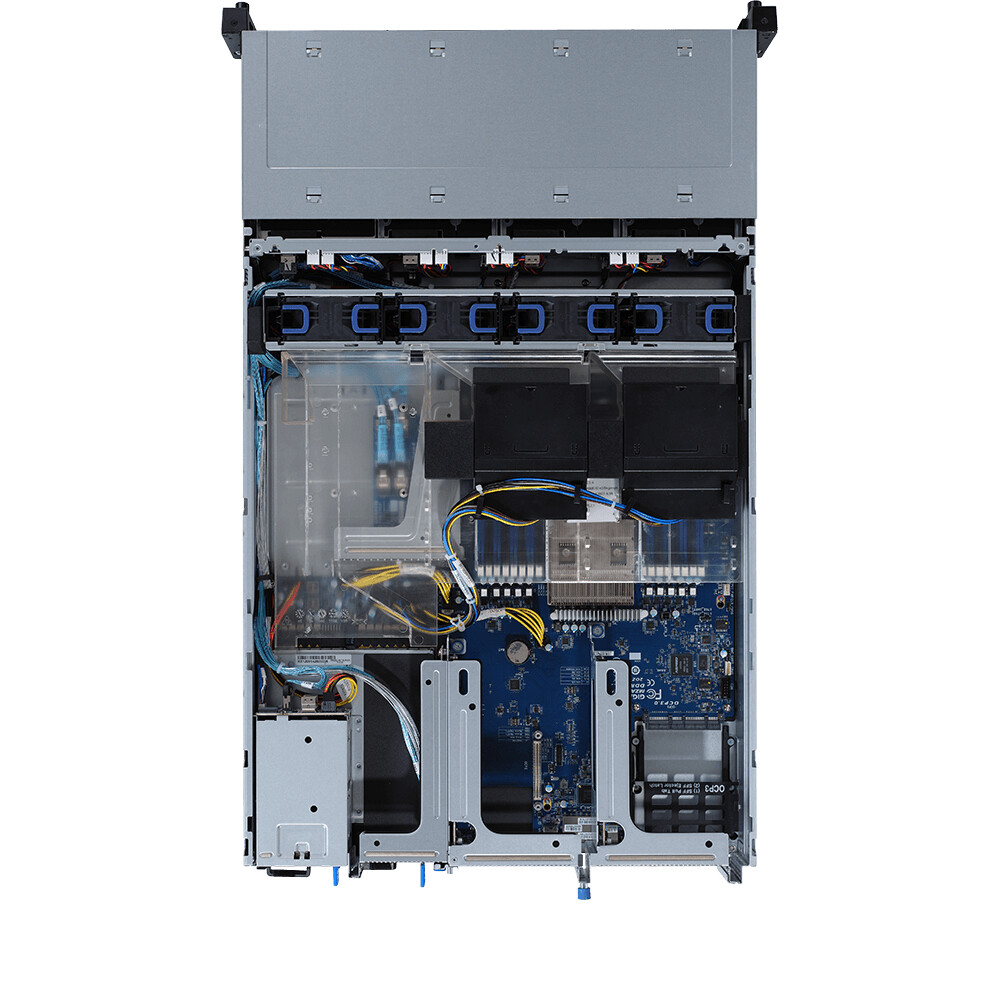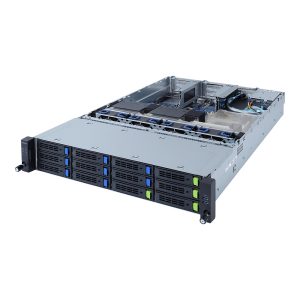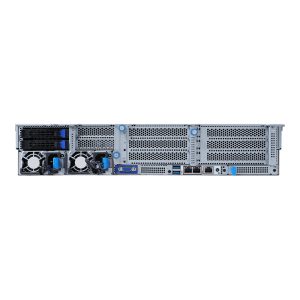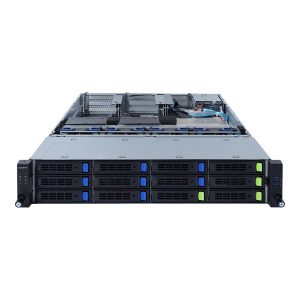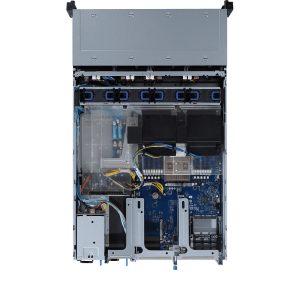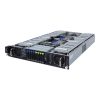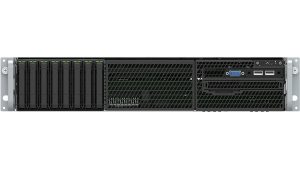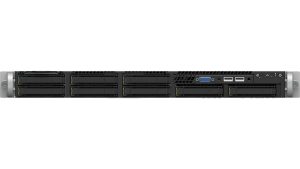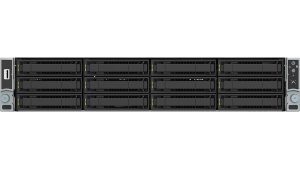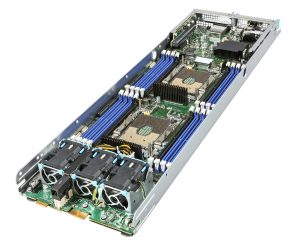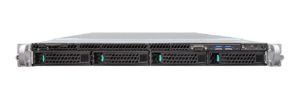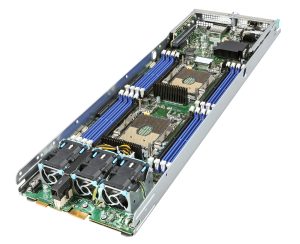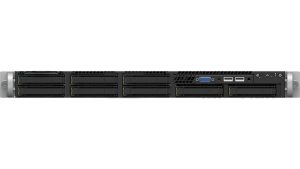Gigabyte R262-ZA2 Socket SP3 Stativ (2U)
29.055,00 kr. inkl. moms (ex. moms 23.244,00 kr.)
Ikke på lager
Giv mig besked når varen kan købes

AMD EPYC™ 7003 Series Processors – “Milan”
GIGABYTE servers and AMD EPYC 7003 Series Processors deliver the highest possible I/O throughput to pave the way for fast communication between CPU and accelerator in HPC and data analytics.
– Up to 64 Cores
– 8 Channels of DDR4-3200
– Up to 4TB Memory Capacity
– 128 lanes PCIe 4.0
– 2-way SMT & Turbo Boost
– 4,6,8-channel Memory Interleave
– Synchronized Fabric and Memory Clock Speeds
– Secure Memory Encryption
– Secure Encrypted Virtualization
Max Memory Speed Even at 2 DPC
With GIGABYTE unique solution, maximum memory speed is now supported, even when using 2 DIMMS per channel*. GIGABYTE’s server platforms give you the performance edge, with more memory capacity at faster speeds.
OCP 3.0 Ready
GIGABYTE’s G-,H-,R- * series offer servers that feature an onboard OCP 3.0 slot for the next generation of PCIe 4.0 add on cards. Advantages of this new type include:
Easier Serviceability: simply slot in / pull out the card without needing to open the server chassis; tool less design
Larger Thermal Envelope: more space for heat sink provides an increased power budget for new & emerging capabilities
Security with RoT and TPM 2.0 module
Hardware-level Root of Trust *
Protection is built in the silicon to ensure systems will not be vulnerable to security attacks or cyber threats. This hardware-level root of trust (ROT) helps isolate the system as the boot process starts to make sure a verified code is used.
Provides:
Integrity of cryptographic keys and secure key generation
Boot process protected and verified
Secure application environment and protection at runtime
Optional TPM 2.0 Module
For hardware-based authentication, passwords, encryption keys, and digital certificates are stored in a TPM module to prevent unwanted users from gaining access to your data. GIGABYTE TPM modules come in either a Serial Peripheral Interface (SPI) or low pin count interface.
Heat and Power Efficiency
Automatic Fan Speed Control
To achieve the best cooling and power efficiency, GIGABYTE servers are enabled with automatic fan speed control. Individual fan speed will be automatically adjusted according to temperature sensors.
Cold Redundancy
To take advantage of the fact that a PSU will run at greater power efficiency with a higher load, GIGABYTE has introduced a power management feature called Cold Redundancy for servers with dual PSUs. When the total system load falls lower than 40%, the system will automatically place one PSU into standby mode, saving up to 10%.
High Availability
Smart Crises Management and Protection (SCMP)
SCMP is a GIGABYTE patented feature that will automatically force the system’s CPU to enter ULFM (ultra-low frequency mode for minimum power consumption) when the BMC is alerted to a PSU fault or error.
Prevents shutdown in systems with non-fully redundant PSU systems when one PSU is lost.
Server Management
GIGABYTE offers free-of-charge server management applications via small processor (BMC) built on the server.
Provides:
– Server health monitoring
– Remote troubleshooting
– Resource utilization monitoring
– Reduction in server downtimes
GIGABYTE Management Console
– Single server management
– Feature-rich and easy to use browser-based interface
– Integration of 3rd party applications
– Automatic recording function
– SAS / RAID controller monitoring function
GIGABYTE Server Management (GSM)
– Multiple server management platform
– Compatible w/ IPMI or Redfish
Certified Ready with Software Partners
Being a member of key software alliance partner programs enables GIGABYTE to together rapidly develop and validate joint solutions, enabling our customers to modernize their data centers and implement IT infrastructure and application services with speed, agility, and cost optimization. GIGABYTE servers have a compatibility across various ecosystems.
Support Various Computing Accelerators
GIGABYTE servers have been tested and validated across a range of workloads with various computing accelerators designed to deliver high levels of performance for deep learning, high performance computing (HPC), enabling data scientists, researchers, and engineers to tackle challenges that were once impossible.
| Vægt | 0,0000 kg |
|---|---|
| Indbygget processer | Ingen |
| Brand | Gigabyte |
| State | Default |
| Antal understøttede processorer | 1 |
| Processorproducent | AMD |
| Antal DIMM-slots | 16 |
| Understøttede hukommelsestyper | DDR4-SDRAM |
| Antal understøttede lagerdiske | 12 |
| Hot-swap HDD båse | Ja |
| Understøttede lagerdisk størrelser | 3.5" |
| Understøttede lagerdrev brugerflader | SATA, Serial Attached SCSI (SAS) |
| Ethernet LAN | Ja |
| Ethernet-grænsefladetype | Gigabit Ethernet |
| Ethernet LAN-porte (RJ-45) | 2 |
| Antal VGA-porte (D-sub) | 1 |
| Trusted Platform Module (TPM) | Ja |
| Kabinettype | Stativ (2U) |
| LED-indikatorer | HDD, LAN, Strøm, System |
| Bredde | 438 mm |
| Dybde | 730 mm |
| Højde | 87,5 mm |
| Processor sokkel | Socket SP3 |
| Processorserie | AMD |
| Maksimal RDIMM hukommelse | 128 GB |
| Maksimal UDIMM hukommelse | 128 GB |
| Understøttet RDIMM-clockhastigheder | 2933,3200 MHz |
| Understøttet UDIMM-clockhastigheder | 3200 MHz |
| Ethernet LAN-datahastigheder | 10,100,1000 Mbit/s |
| PCI Express slots version | 4.0 |
| PCI Ekspres x8 slots | 4 |
| PCI Express x16 slots | 4 |
| Trusted Platform Module (TPM) version | 2.0 |
| Harmoniseret systemkode (HS) | 84714100 |
| Strømforsyning | 1600 W |
| Emballageindhold | 1 x R262-ZA21 x CPU heatsink1 x Rail kit |
| Antal 3.5" bays | 12 |
| Understøttet datalagringsdrev typer | HDD & SSD |
| On-board grafikkort, model | Aspeed AST2500 |
| LAN Kontroller | Intel® I350-AM2 |
| Knap til nulstilling | Ja |
| Antal blæsere | 4 blæser(e) |
| Ventilator diameter | 8 cm |
| Vekselstrømsindgangsspænding | 200 – 240 V |
| Vekselstrømsindgangsfrekvens | 47 – 63 Hz |
| 80 PLUS certificering | 80 PLUS Platinum |
| Driftstemperatur (T-T) | 10 – 35 °C |
| Opbevaringstemperatur (T-T) | -40 – 60 °C |
| Relativ luftfugtighed ved drift (H-H) | 8 – 80% |
| Relativ luftfugtighed ved opbevaring (H-H) | 20 – 95% |
| Kompatible operativsystemer | Windows Server 2016 ( X2APIC/256T not supported)Windows Server 2019Red Hat Enterprise Linux 8.3 ( x64) or laterSUSE Linux Enterprise Server 12 SP5 ( x64) or laterSUSE Linux Enterprise Server 15 SP2 ( x64) or laterUbuntu 18.04.5 LTS (x64) or laterUbuntu 20.04 LTS (x64) or laterVMware ESXi 6.7 Update3 P03 or laterVMware ESXi 7.0 Update1 or laterCitrix Hypervisor 8.2.0 or later |
| Tænd-/slukkontakt | Ja |
| Pakkebredde | 588 mm |
| Pakkedybde | 947 mm |
| Pakkehøjde | 268 mm |
| Understøttet DIMM modul kapaciteter | 8GB, 16GB, 32GB, 64GB, 128GB |
| Indgangsstrøm | 12 – 7 A |
| Antal af hovedstrømforsyninger | 2 |
| DC udgående strøm (+12 V) | 132 A |
| Antal M.2 (M) slots | 1 |
